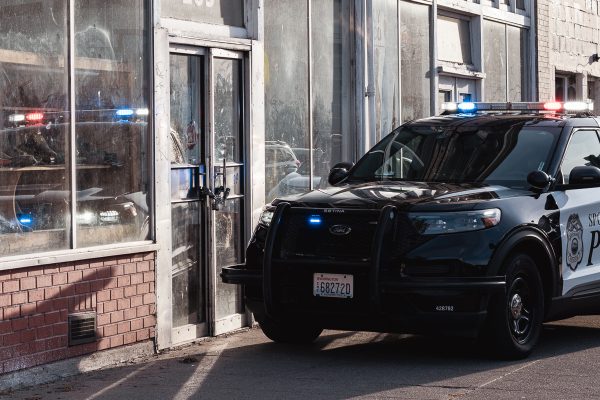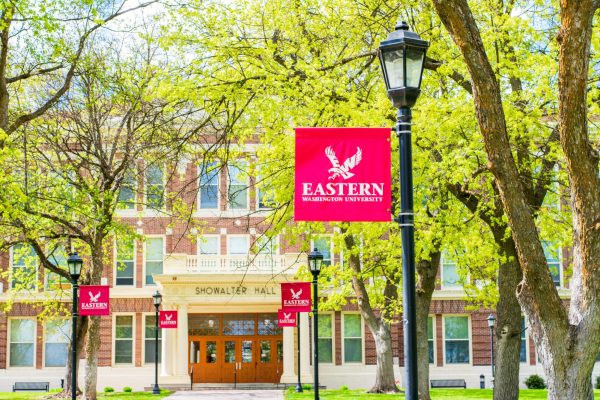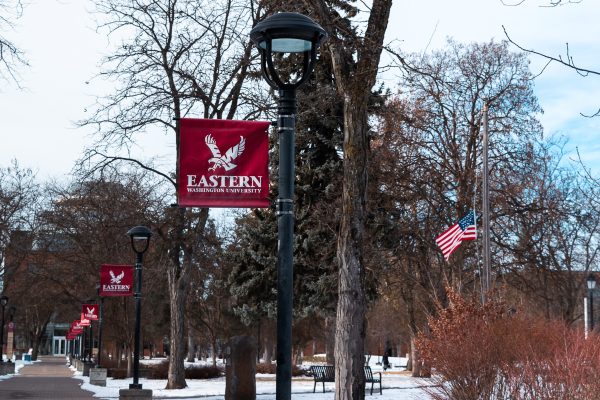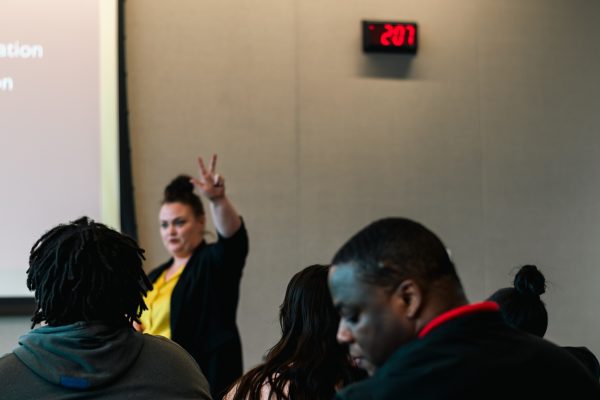Residents share I-502 concerns
More than 450 attend state liquor control board forum to discuss marijuana legalization
February 21, 2013

Easterner Graphics
In an effort to let citizens sound off on the implementation of controversial Initiative 502, the Washington State Liquor Control Board has been holding open forums across the state.
Having already held open forums in Olympia, Seattle and Vancouver, the board visited Spokane Feb. 12 for its first stop in eastern Washington.
“The big interest for me was to see if we would have this much interest east of the Cascades as we did west of the Cascades,” said Sharon Foster, chair of the board.
Officials estimated that more than 450 people showed up at the Convention Center to hear community concerns and questions about the rules regarding the marijuana legalization process.
“This is very unusual for us,” said board member Chris Marr. “Normally, rule making in an agency like the Liquor Control Board is very formal, and it’s really designed to let you comment after we’ve already pretty much written the rules. We decided to do this a little differently. … This is an initiative of the people, and I think people have a lot of ownership in it. They need to feel like they were heard before the process really got too far underway because this is unique.”
The new law will operate on a three-tier system similar to the regulation of liquor, according to Pat Kohler, agency director of the board.
“In this three-tier system we have to create licenses. We have to create a producer license, a process license and a retail license. A producer and a processor can be the same person, but you can’t be all three tiers.”
Rules and regulations regarding licenses will be constructed in the coming months.
“What we’re trying to achieve in implementing I-502 is a strictly controlled and regulated cannabis market,” Kohler said.
Board member Ruthann Kurose called the creation of a regulatory system “more far sweeping than any regulation of marijuana in history with a wide array of complexities to address from issues in areas of consumer demand, enforcement, licensing, retailing and product safety.”
The board decided to hold open forums as a way to hear citizen input before it started developing concrete rules. Citizens who signed up to give testimony were given the chance to speak for two minutes.
Some citizens, like Esther Larsen of the Washington Alliance for Drug Endangered Children, shared concern for public safety.
“Our mission is to pursue safety for our most vulnerable citizens—our children,” she said.
Larsen requested that marijuana-related sponsorship and product placement in public entertainment venues be banned and also asked for safety precautions involving marijuana packaging.
“We also would like to bring to your attention that there should be childproof packaging and consumer protection labeling in order to protect children,” she said.
Linda Thompson, who represented the Greater Spokane Substance Abuse Council, echoed Larsen’s concerns for public safety, and she requested that vendors have mandatory training.
“We want to know that our vendors are trained, they know how to give out the product and they know that people who are getting it are going to be safe when they’re using it,” she said.
Kevin Oliver, executive director of The Washington Affiliate of the National Organization for the Reform of Marijuana Law, called the passing of I-502 “a great cause to celebrate.”
“Spokane is important because we are an average American city. As such, if citizens approve of something in Spokane, chances are good citizens will approve it anywhere in the United States. And Spokane approves of marijuana legalization, about 53 percent county-wide. … Anyone capable of demonstrating the ability to produce high quality marijuana—clean marijuana—should then be allowed to enter the market as a producer,” Oliver said.
Citizens also shared testimony about environmental impact, federal law, medical marijuana and general concerns over regulations.
EWU senior Cheryl Landeros, who is studying accounting and finance, attended the forum to learn more about the regulations. She said family members who are considering going into the marijuana industry have turned to her because of her accounting background.
“I’ve got several people who keep asking me about the implementation and how to open up a business, and I don’t really have any answers for them,” she said.
Landeros said she thought there was a lot of ambiguity surrounding the implementation of I-502.
“I think they’re trying to get more of the community’s feedback, because they really don’t have any definitive answers. I think a lot of it is that because it’s not something that has ever been done before,” she said.
Foster pointed out that the initiative, which was approved by 55 percent of voters, was not written by the Liquor Control Board.
“We do believe it was written as well as almost any initiative can be written. There’s still a lot of little glitches in it that need to be smoothed out. We will do our best as we can in the rule making, but remember that we did not write it. …We’re here to listen.”






![Simmons said the biggest reasons for her success this year were “God, hard work, and trusting [her] coach and what she has planned.”](https://theeasterner.org/wp-content/uploads/2024/05/image1-1-1200x800.jpg)










